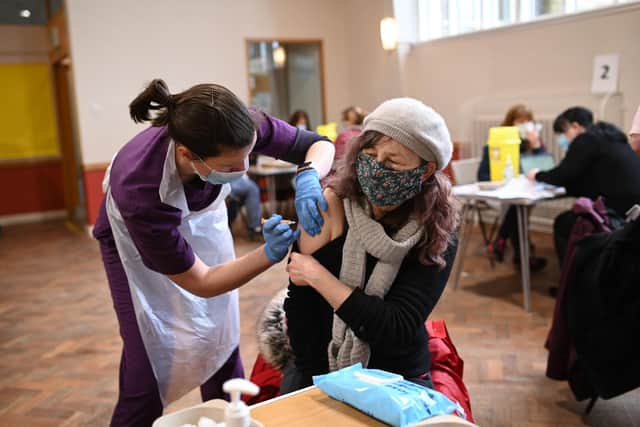Every person who will now be offered an alternative to AstraZeneca jab - full list
and live on Freeview channel 276
The Medicines and Healthcare products Regulatory Agency (MHRA) said the benefits of the vaccine still outweigh the risks overall, but while it has not concluded that the vaccine causes rare brain clots, it says the link is getting firmer.
The MHRA said the balance of risk for the AstraZeneca vaccine is very favourable for older people but “more finely balanced” for younger groups, who do not tend to suffer serious Covid illness.
Advertisement
Hide AdAdvertisement
Hide AdAs a result, people aged 18 to 29 will be offered the Pfizer, Moderna or other jabs that come on stream as the vaccination programme rolls out across the UK.


Separately, a review by the European Medicines Agency (EMA) concluded on Wednesday that “unusual blood clots with low blood platelets should be listed as very rare side effects” of the Oxford/AstraZeneca vaccine.
Emer Cooke, executive director of EMA, said its review “confirmed that the benefits of the AstraZeneca vaccine in preventing Covid-19 overall outweigh the risk of side effects”, adding: “Vaccination is extremely important in helping us in the fight against Covid-19.”
Dr Sabine Straus, safety committee chairwoman at the EMA, said: “This vaccine has proven to be highly effective, it prevents severe disease and hospitalisation and it is saving lives.
Advertisement
Hide AdAdvertisement
Hide Ad“Vaccination is extremely important in helping us in the fight against Covid-19 and we need to use the vaccines we have to protect us from the devastating effects.”
Up to March 31, the MHRA in the UK has received 79 reports of blood clots accompanied by low blood platelet count, all in people who had their first dose of the vaccine, out of around 20 million doses given.
England’s deputy chief medical officer Professor Jonathan Van-Tam used a nautical analogy to describe the “course correction” in the vaccination programme.
He said changes were made to the flu vaccine programme a few years ago and “changes in preference for vaccines are business as usual”.
Advertisement
Hide AdAdvertisement
Hide AdHe added: “This is a massive beast that we are driving along at enormous pace with enormous success, this vaccine programme.
“If you sail a massive liner across the Atlantic then it’s not really reasonable that you aren’t going to have to make at least one course correction during that voyage.”
He said it would be “pretty absurd” to withhold the AstraZeneca vaccine from the over-40s.
“The idea of withholding a vaccine where a potential harm, for example in the 40-49 group, is 0.5 harms per 100,000 people versus 51.5 intensive care admissions averted, and that’s not taking into account hospitalisations, long Covid and spreading to others, then the notion that you would clip the vaccine at that point is pretty absurd really.
Advertisement
Hide AdAdvertisement
Hide Ad“So it is very much an independent decision but I think it has been taken in an extremely rational way.”
The MHRA said that those who have had their first dose of the AstraZeneca vaccine should still get their second dose.
Only those who suffered a rare blood clot after the first dose should not get vaccinated.
Anyone with blood disorders that leave them at risk of clotting should discuss the benefits and risks of vaccination with their doctor before going for a jab.